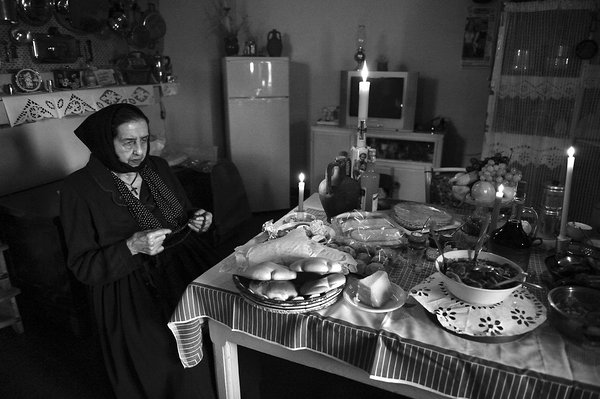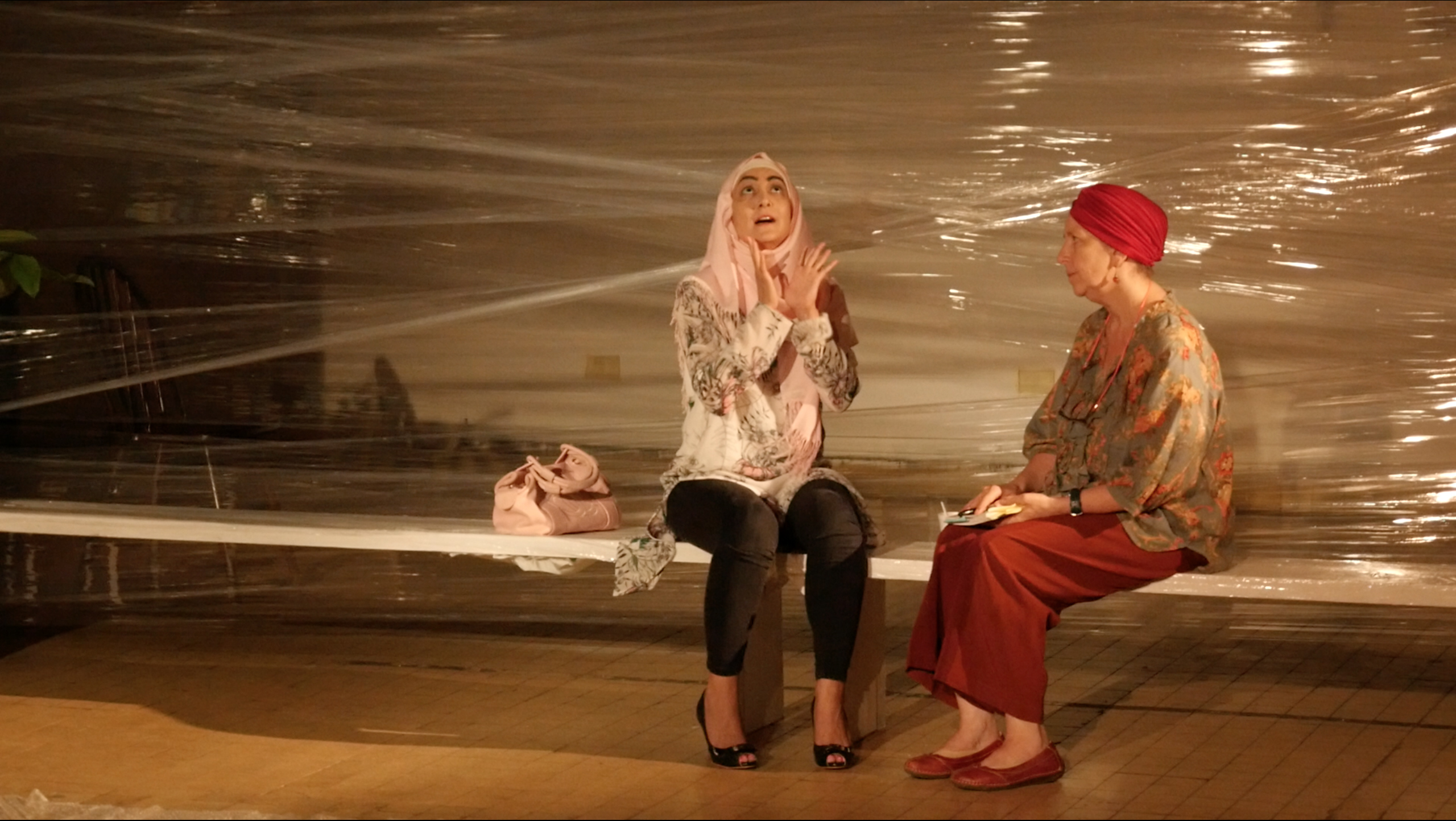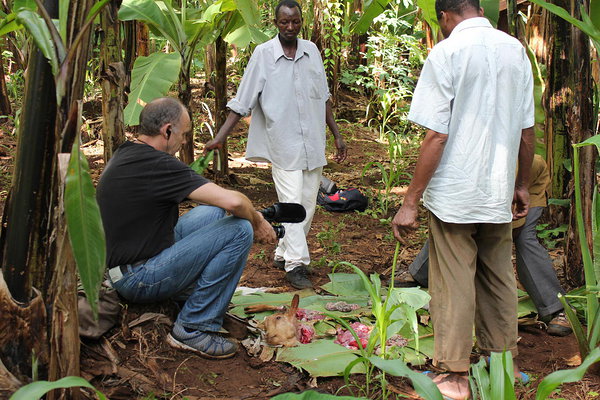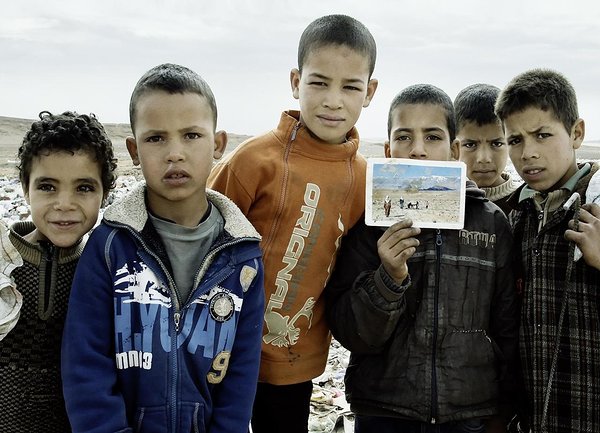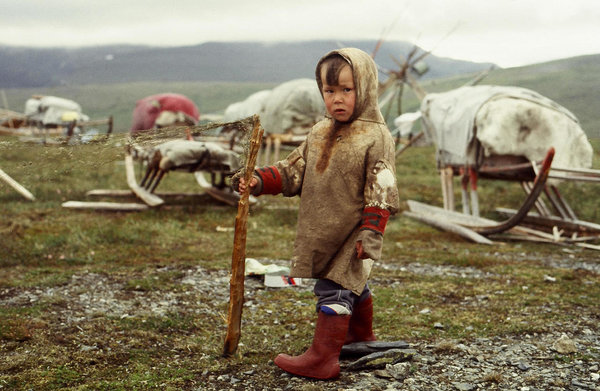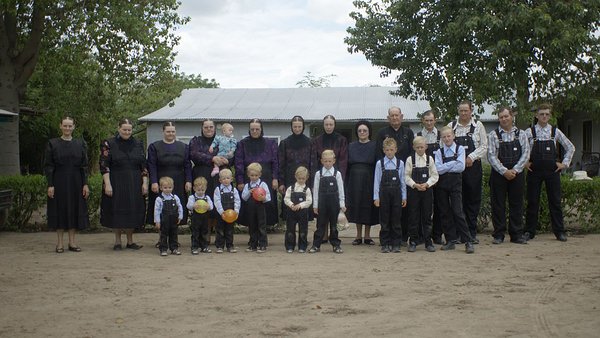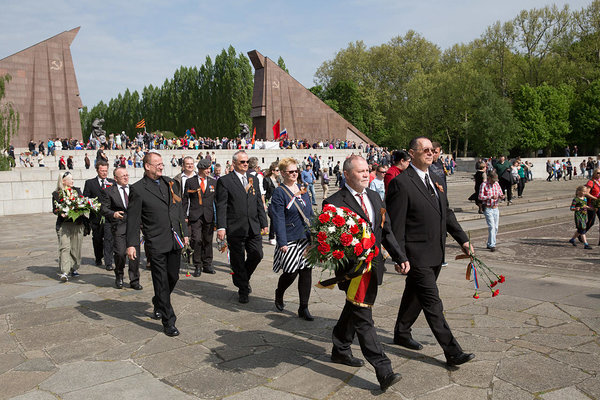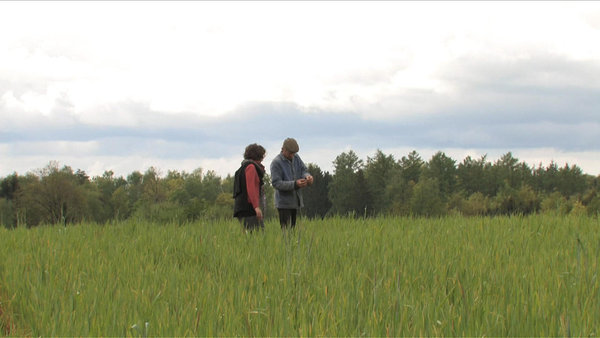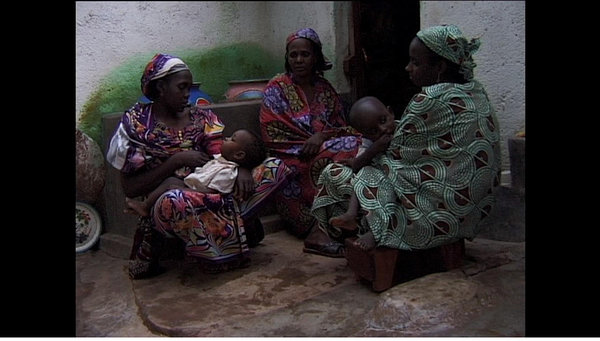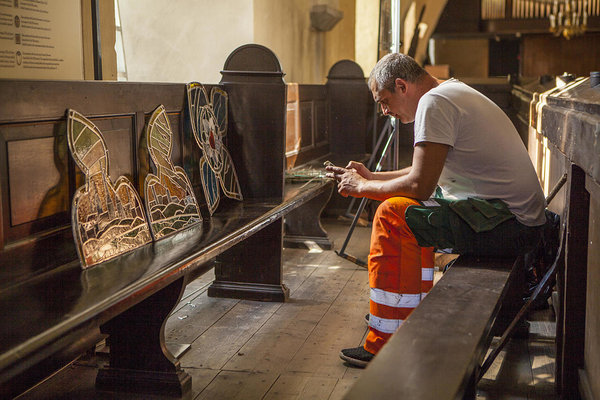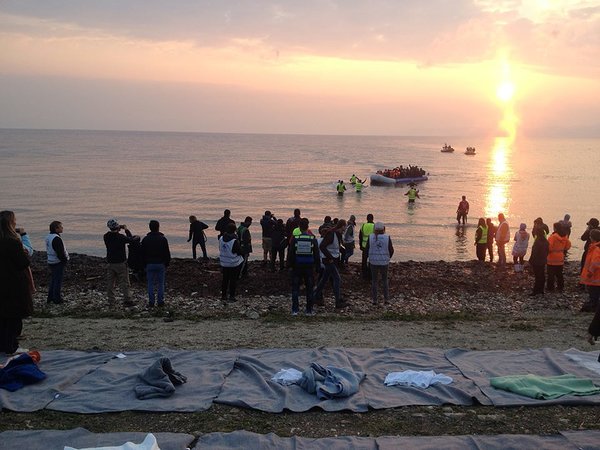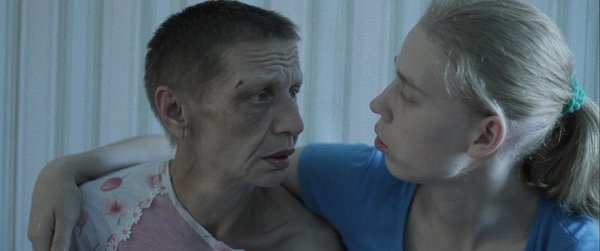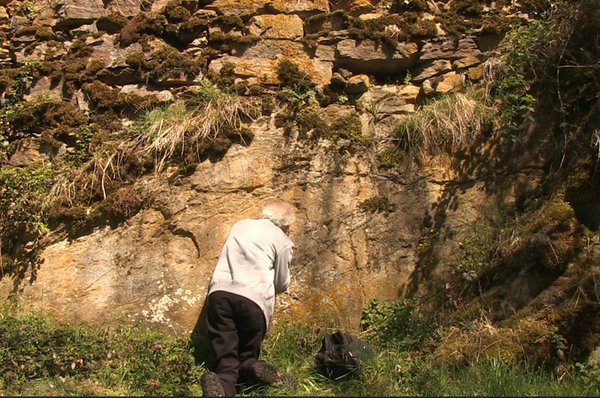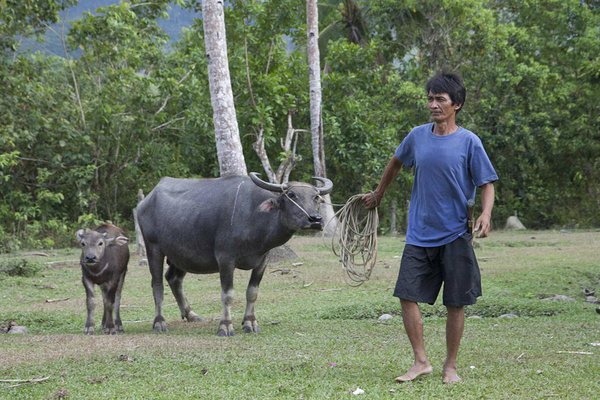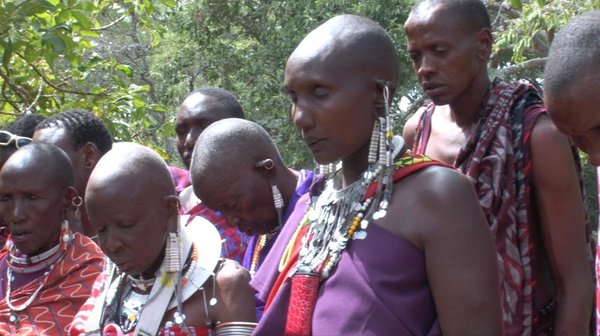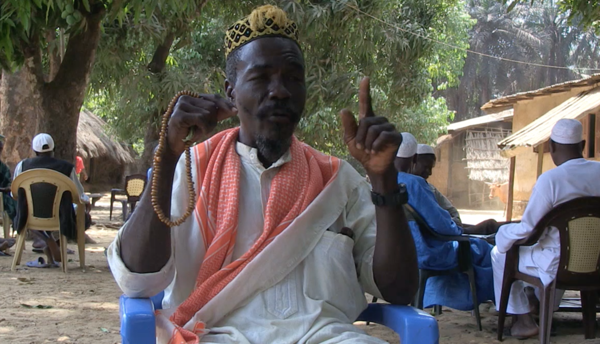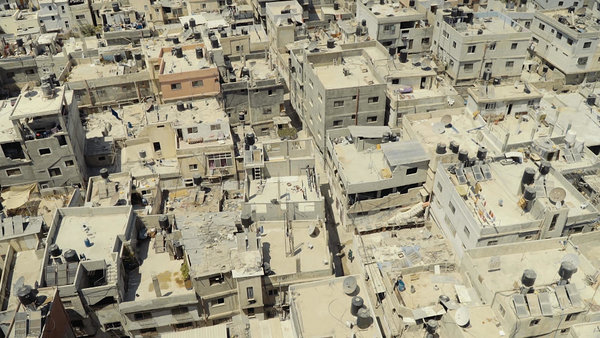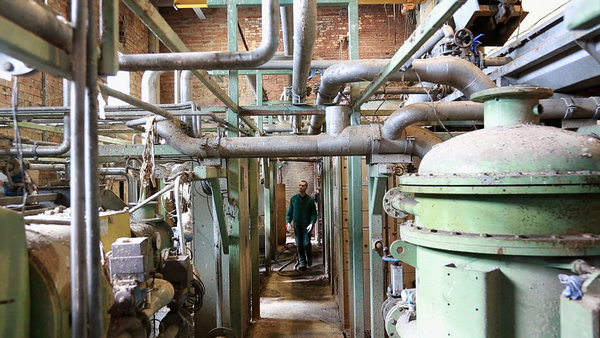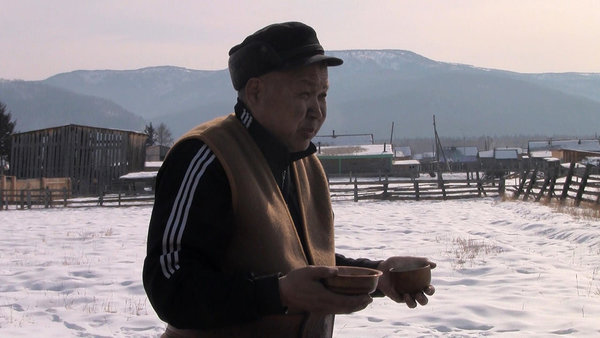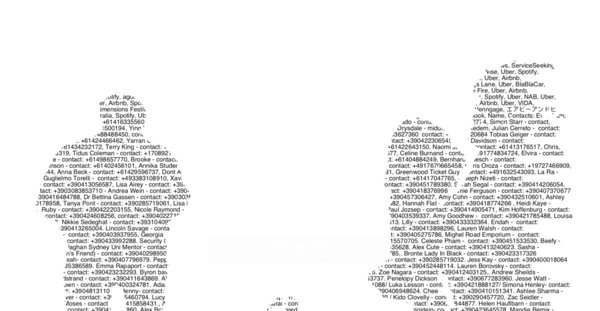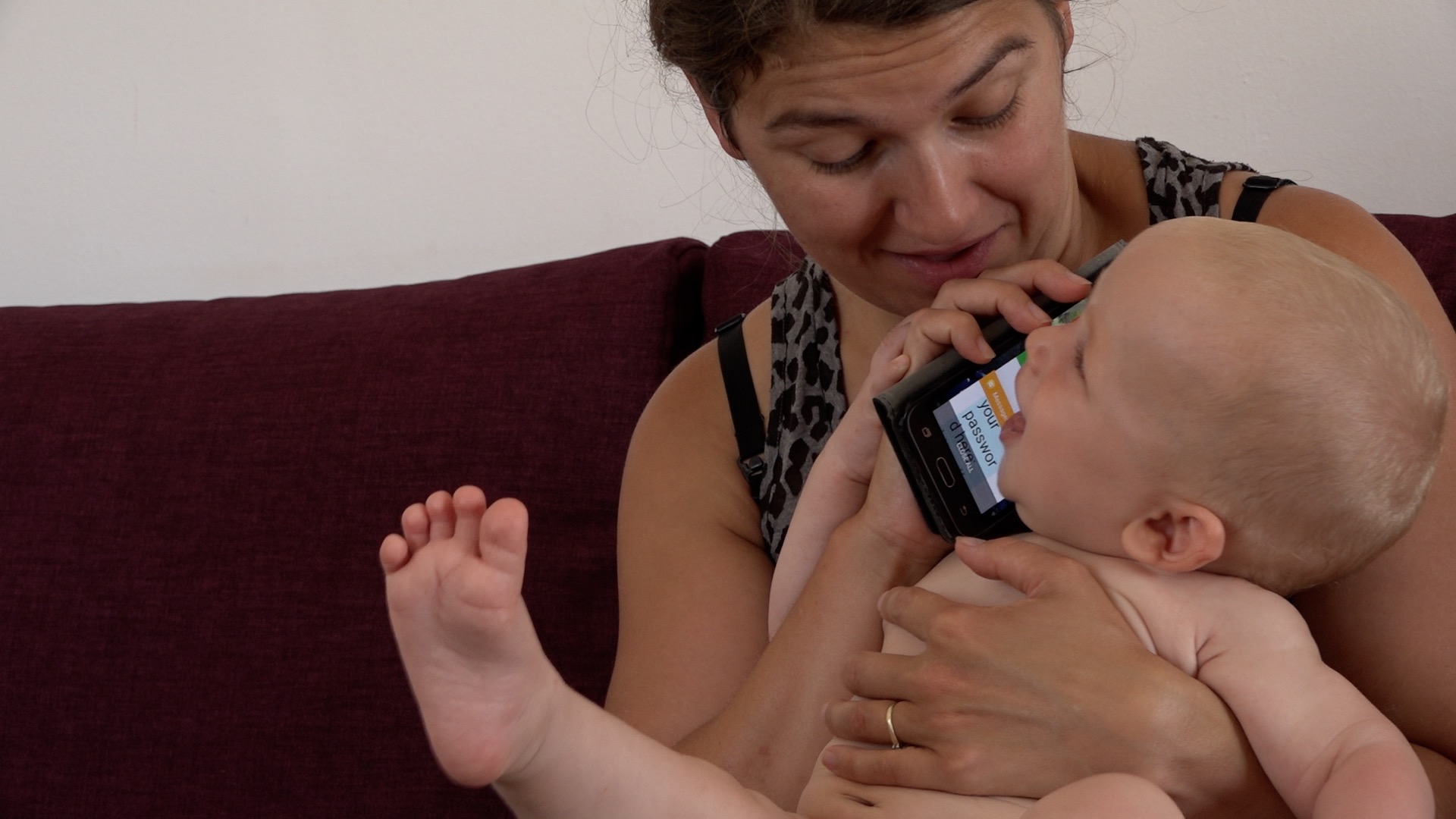SEMINAR OF VISUAL ANTHROPOLOGY
Seminar of visual anthropology is dedicated to the celebration of the 15th edition of the festival. The seminar has an academic approach and important part of it is the discussion about the films and their topics. So the screening is accompanied by a short presentation about the research and film(making).
Nani
- Year of release: 2017
- Duration: 30 min
- Director: Roman Stocker
- Original Language: Swiss German
- Country of production: Switzerland
- Shooting location: Switzerland
The filmmakers 89 year-old grandmother (swiss-german: Nani), finds time - after her husband dies - to look back on her life and deliberate her thoughts about ageing and dying. The film was shot during one year, showing an intimate portrait about the process Nani is going through after the death of her husband, the chores of her everyday routine living now alone and her reflections about being near at the border between life and death.
Director info
Roman Stocker (born 1992) is a Bachelor student at the Institute of Social Anthropology at the University of Bern, Switzerland, with special interest in audio-visual ethnography and documentary filmmaking. Currently he is doing a professional apprenticeship in video production in Zurich.Supper for the Dead Souls
- Year of release: 2017
- Duration: 16 min
- Director: Ignazio Figus
- Original Language: Italian, Sardinian
- Country of production: Italy
- Shooting location: Italy
“…The dead souls enter into homes at midnight, passing around the laden tables, departing afterwards satiated only by the aroma of the food. If, instead no dish has been prepared the dead leave accompanied by heavy sighing...” It is still alive in Sardinia the ancient habit of leaving served on the table, on the night between 1st and 2nd November, a supper for their own dead, consisting of a full meal characterized by "sos macarrones de sos mortos" (the macaroni of the dead). Filmed in Orune, in central Sardinia, this documentary describes the preparation of the banquet and some connected rituals.
Director info
Ignazio Figus is born in Alghero, he lives and works in Nuoro (Sardinia). He learnt about documentary production at the Istituto Superiore Regionale Etnografico, where he was worked since 1987. He is responsible for the audiovisual activities of the institute. His first directing experience was in 1996 with the documentary Giorni di Lollove (Days of Lollove), wich focused on the daily life and festive occasions of a small outward lying ward of Nuoro.
He has collaborated on several significant productions outside the ISRE, of these it is worth remembering Mario Delitala, l’armonia totale dell’arte (ISRE-ILISSO, 1999) Giuseppe, pastore di periferia (condiVisioni, 2004), Trittico Pastorale (condiVisioni, 2008), Il Coraggio e la Poesia ( 2010), Ab Origine - Biofilm (condiVisioni with the support of BioSardinia and Slow Food, 2015).
I am Waiting for You
- Year of release: 2017
- Duration: 27 min
- Director: Paloma Yáñez Serrano, Benjamin Llorens Rocamora
- Original Language: Arabic, English, French
- Country of production: Spain
- Shooting location: Beirut
In a room, a group of women (and one man) sit waiting. Some have been waiting for weeks, others for years, still others seem to have been waiting forever. They wait patiently and impatiently, nervously and calmly, hopefully and resignedly. That disease, that thing, the bad disease: these are just some of the terms we use to name and shame cancer and cancer patients in the Arab world. I am Waiting for You aims to break the taboos we have put in place vis-a-vis cancer, to contemplate our fears and disavowals and to listen to experiences we have for long rendered unspeakable. How does cancer impact upon one's relationship with oneself and with others – doctors, husbands, lovers, children, fellow sufferers? Why is women's cancer so often defined as a period of interminable waiting with neither beginning nor end? Why do we insist on perceiving it as “end-of-life” narrative rather than a journey towards recovery?
The film was funded by the "Cross-Language Dynamics: Reshaping Community" (CLDRC) research project, part of the Open World Research Initiative which the UK's Arts and Humanities Research Council launched to promote the significance of Modern Languages research to contemporary issues.
The film was funded by the "Cross-Language Dynamics: Reshaping Community" (CLDRC) research project, part of the Open World Research Initiative which the UK's Arts and Humanities Research Council launched to promote the significance of Modern Languages research to contemporary issues.
Director info
Paloma and Benjamin are two independent ethnographic filmmakers interested in the methods of adaptation humans develop to address changing environment, technology and political conflicts. They have been working for seven years making films and research projects in Congo, Egypt, Jordan, Lebanon, Spain, Brazil and Mexico. In parallel, they worked as a facilitators of text and mix-media interactive workshops with children and adults. Paloma is currently doing a PhD in visual anthropology at the University of Manchester studying people’s adaptation to industrial agriculture and changing landscape in the south of Spain.Atali's Gift
- Year of release: 2017
- Duration: 43 min
- Director: Frode Storaas, Knut Chr. Myhre
- Original Language: Chagga, Kiswahili, English
- Country of production: Tanzania
- Shooting location: Tanzania
Atali has recently moved back to his homestead in Rombo District on the eastern slopes of Mount Kilimanjaro in northern Tanzania. For nearly twenty years, he has pursued university studies and engaged in various business ventures, but these have brought him few material rewards. Atali is determined to turn his life around and is convinced he needs for this purpose to settle some longstanding matters pertaining to his long-deceased father and father’s father. His path to a better future goes through the past and requires an intervention in the present. A visit from the anthropologist Knut Christian Myhre, who has long lived in Atali’s house while conducting research in the area, provides Atali with the impetus to proceed with his plans. He will need a new belonging and a new name. A ceremony is required. But will his elderly mother agree?
Director info
Knut Christian Myhre is a social anthropologist with long-term research experience from both rural and urban areas of Tanzania. He trained at the University of Oxford and has published on a range of topics that include kinship, witchcraft, ritual, exchange, forms of knowledge, and cross-cultural comparison. Myhre works as a researcher at the Museum of Cultural History in the University of Oslo. Frode Storaas is a professor in visual anthropology at the University Museum of Bergen, Norway. His research has mainly been based on fieldwork in East Africa. As a filmmaker he has worked in several countries.Changa Revisited
- Year of release: 2016
- Duration: 60 min
- Director: Peter Biella, Leonard Kamerling
- Original Language: Maasai, Swhahili
- Country of production: United States
- Shooting location: Tanzania
Changa Revisited is the story of Tanzania Maasai elder, Toreto ole Koisenge, and his family, seen from two points in time across a thirty year divide. His life has changed since filmmaker / anthropologist Peter Biella first visited his homestead more than thirty years ago. Then he had six hundred cattle. Now disease has reduced his herd to twenty. The world of Maasai pastoralists has grown smaller since the Tanzania government put an end to their seasonal cattle migrations. “What else can you do except change?,” asks Toreto. The film draws on hundreds of photographs and audio recordings taken in 1980. These images, together with contemporary video, create a rare view across time, one that brings viewers into the changing emotional landscape of a Maasai family. Changa Revisited is about the deeply personal unfolding of a family’s journey through thirty years of tumultuous change.
Director info
Leonard Kamerling is Curator of Film at the University of Alaska Museum of the North. His films on Alaska Native cultures have won numerous international awards. His film Uksuum Cauyai: the Drums of Winter, about Yup’ik Eskimo traditional music and dance, was named to the National Film Registry of the US Library of Congress in 2006. Throughout his career Leonard Kamerling has been primarily concerned with issues of cultural representation in film and the role that documentary film can play in eliminating stereotypes and in credibly translating one culture to the other.
Dr. Peter Biella directs the Program in Visual Anthropology at San Francisco State University. He has made films in the US, Egypt, El Salvador, Peru, and Romania but he works primarily with Tanzania Maasai. His recent film co-directed with Leonard Kamerling, Changa Revisited, which looks at a single family at both ends of a 30 year divide, won the Best International Documentary Award at the 2016 Astra Film Festival.
OPENING FILM - Untitled
- Year of release: 2017
- Duration: 107 min
- Director: Michael Glawogger, Monika Willi
- Original Language: German, English
- Country of production: Austria
- Shooting location: Austria, Germany
"I want to give a view of the world that can only emerge by not pursuing any particular theme, by refraining from passing judgment, proceeding without aim. Drifting with no direction except one’s own curiosity and intuition.” (Michael Glawogger)
Michael Glawogger had the vision of his most ambitious film up to date: to film reality as it appeared in front of his camera to show the poetic wonders of the world. He and his crew embarked in an epic trip through Italy, the Balkans, North and West Africa but 4 months and 19 days into his journey, he died dramatically in April 2014 in Liberia, after contracting the most aggressive form of malaria, leaving this epic project unfinished. More than two years later, film editor Monika Willi realizes a film out of the film footage. This is a journey into the world to observe, listen and experience, the eye attentive, courageous and raw.
Director info
Michael Glawogger was born in Graz, Austria, on December 3, 1959. After graduating from high school he studied at the San Francisco Art Institute and the Vienna Film Academy. He began his career as an assistant camera operator, later working as cinematographer, and finally as screenwriter and director. Between 1981 and 2013 he made numerous internationally acclaimed shorts, documentaries, and feature films. In recent years he had
also devoted himself to literary writing. His novel “69 Hotelzimmer” was published posthumously. Michael Glawogger died in Monrovia, Liberia, in April 2014 while shooting “Untitled”. His premature death interrupted collaboration on a number of feature film projects, among others with writers such as William T. Vollmann, Michael Ostrowski, Eva Menasse, and Sybille Berg.
Monika Willi, born in Innsbruck, Austria, on May 29, 1968, is an Austrian film editor known for her many years of collaboration with Michael Glawogger (e.g. France, Here We Come!, Workingman’s Death, Contact High, Whores’ Glory) and Michael Haneke (e.g. The Piano Teacher, Time of the Wolf, The White Ribbon, Amour, Happy End). She has also worked regularly with Barbara Albert (Northern Skirts, Free Radicals, The Dead and the Living) and Florian Flicker (Suzie Washington, Hold-Up). Monika Willi has received many awards and nominations for her work: She was nominated for the Austrian Film Prize for “Whores’ Glory” (Michael Glawogger, 2011) and the German Film Prize for “The White Ribbon” (Michael Haneke, 2010). In 2012 she was nominated for the César Award for her work on Michael Haneke’s film “Amour”. She received the Austrian Film Prize (Best Film Editing) for Barbara Albert’s “The Dead and the Living” (2012) and the Filmplus Award for Best Feature Film Editing for Haneke’s “The White Ribbon” (2009) as well as for Barbara Eder’s “Thank You for Bombing” (2016). “Untitled” is Monika Willi’s co-directing debut.
NOMADS
Drokpa
- Year of release: 2016
- Duration: 79 min
- Director: Yan Chun Su
- Original Language: Tibetan
- Country of production: United States
- Shooting location: China
Set in the high plateau of eastern Tibet, Drokpa is an intimate portrait of the lives and struggles of Tibetan nomads whose life is on the cusp of irreversible change. Richly observed daily lives and family relationships, especially those of Tamku, a teenage single mother, Dhongya, a senior nomad and Yithan, a mother of two boys are at once deeply personal and illustrative of the universal issues of gender, freedom, adaptation to a changing climate and the resilience of human spirits.
Director info
Yan Chun Su is a self-taught documentary filmmaker currently based in Colorado. After a career in computer science, her interests in traditional cultures and the environment have taken her to work with and live among many indigenous communities around the world. Third-class Travel
- Year of release: 2017
- Duration: 82 min
- Director: Rodion Ismailov
- Original Language: Russian
- Country of production: Russia
- Shooting location: Russia
A documentary film which recounts the lives of passengers travelling on the longest railway route in the world. The director tells the stories and fortunes of ordinary Russians met by chance on the Moscow-Vladivostok train. The endless journey is a metaphor of the country in perpetual motion, while the passengers' stories form a social portrait of contemporary Russian society.
Director info
Rodion Ismailov was born in Azerbaijan. In 1998 he graduated from the Saint-Petersburg State University of Cinematography and Television, specialized in film-directing. Rodion founded "Deboshir Film Studio" in 1997, and from 2000 till 2005, he was the president of Saint Petersburg Fund "Independent Cinema Fund". Since 2009 he has been the director and producer in production centre "DC Film".Chasing Houses
- Year of release: 2017
- Duration: 60 min
- Director: Justin Time
- Original Language: English
- Country of production: Germany
- Shooting location: United States
The documentary road movie follows mobile homes accross the highway, connecting the grandiose vastness of the American West to the transitory nature of the homes and the tenuous life stories of their inhabitants. In fragmented stopovers, the film revolves around questions of home, belonging, wealth and the American Dream. Sketched encounters with a former Las Vegas showgirl, a desert recluse, a Navajo couple and a Tea Party member reveal views of hopes and dead-end prospects, class conflicts and the „moving-on mentality“.
Director info
Justin Time is a stone mason turned visual artist turned filmmaker. After the apprenticeship he went on a traditional journey around Europe for three years - a foundation for becoming a documentary filmmaker. He went to study Fine Arts in Berlin Weißensee and Urban Studies at the San Francisco Art Institute. To Siberia, My Love
- Year of release: 206
- Duration: 67 min
- Director: Peter Flinckenberg
- Original Language: Finnish, Russian
- Country of production: Finland
- Shooting location: Russia
A "road movie" about a retired couple making one more trip to the harsh wilderness of their beloved Siberian tundra. Kirill Gluschkoff and Marianna Flinckenberg-Gluschkoff are a couple who will not settle for conventional travelling. Since 1968 they have headed for the Arctic, to experience life and people in their purely traditional forms. “To Siberia, my Love” is a story about aging couple’s trip to their beloved Siberian tundra to meet old Nenets friends. A lot has changed since their last visit. Yet, time can't be stopped, and in the darkness of the chum, they all know that an era has come to an end. Just like the body that will not last forever, a culture based on sensitivity and closeness to nature will not be able to keep out the Western ways of life forever.
Director info
Peter Flinckenberg studied art and law before turning into filmmaking. He graduated from the University of Art and Design in Helsinki and after that his career took off. Peter’s film “Concrete Night” premiered at the 2013 Toronto Film Festival and was nominated to the Camera image main competition. The film also won a Jussi, the Finnish equivalent of the Academy Award for Best Cinematography. His short film “Do I Have to Take Care of Everything” was an Academy Award Nominee in 2014. Peter enjoys documentary and feature work but still loves shooting commercials.THE POSSIBILITY OF BEING HUMAN IN THE AGE OF TECHNOLOGY
The Quiet Zone
- Year of release: 2017
- Duration: 45 min
- Director: Daniel Froidevaux, Elisa Gonzalez
- Original Language: English
- Country of production: Canada
- Shooting location: United States
A community of electrically sensitive people is fleeing to a remote mountainous region of West Virginia called the National Radio Quiet Zone. In the shadow of one of the world’s largest and most sensitive radio telescopes, The Quiet Zone follows four characters as they adapt to life in this unique environment. The film draws a subtle parallel between the telescope and the electro-sensitive community, reflecting our growing concerns and ambivalence about the relentless permeation of communications technology.
Director info
Elisa Gonzalez is rooted in the fine arts practicing as a filmmaker, multi-media artist and educator. Her work ranges from experimental to interactive documentary that has exhibited internationally including Pierre-Francois Ouellette Art Contemporain and The Smithsonian Arctic Studies Center at the Anchorage Museum. Her work explores the inherent tension between memory and history, technology and the individual through contemporary documentary form. She currently lives in Toronto, Canada.
Daniel Froidevaux is a documentary filmmaker and video artist whose work focuses on themes of memory and history, technology and identity. A graduate of Ryerson’s Master’s in Documentary Media Program, his work lies at the intersection of documentary film and contemporary art, and has shown in galleries and festivals in Canada and Internationally. The Quiet Zone, is the final iteration of an on-going project with collaborator and co-director Elisa Gonzalez.
The World is Mine
- Year of release: 2017
- Duration: 70 min
- Director: Ann Oren
- Original Language: English, Japanese
- Country of production: Israel
- Shooting location: Japan
“Talented fans constantly re-create her, that's why she never dies. She is a creative instigator. A collective fantasy. A social glue. Hatsune Miku is the future.” – Hiro San
In cosplay of the Japanese cyber diva Hatsune Miku, the director moves to Tokyo, seeking an identity in the world of Miku fanatics, where she is drawn into a love affair with one of the fans. Miku is a Vocaloid, a vocal synthesizer software personified by a cute animated character. Her entire persona: lyrics, music and animation – is fan created, and that's her charm. By transforming herself into a Miku character through cosplay, Oren enters a world of real hardcore fans where fantasy is more real than reality and the differentiation between the two becomes obsolete.
Director info
Ann is a visual artist and filmmaker. She was born in Tel-Aviv, received a BFA in Film and an MFA in Fine Arts, both from The School of Visual Arts, NY. Solo exhibitions and screenings at Künstlerhaus Bethanien, Berlin, Cindy Rucker Gallery, NY, Anthology Film Archives, NY, Apexart, NY, The Tel-Aviv Cinematheque and MediaLab Prado, Madrid. Group exhibitions at The Hammer Museum, Moscow Biennale for young art, The Tel Aviv Museum, Rochester Contemporary Art Center, WRO Art center's Media Art Biennale, PS122, NY, Ann Arbor Film Festival, The Carnegie Mellon Film Festival and The Social Media Film Festival. Donna Haraway: Story Telling for Earthly Survival
- Year of release: 2016
- Duration: 81 min
- Director: Fabrizio Terranova
- Original Language: English
- Country of production: Belgium
- Shooting location: United States
Donna Haraway is a prominent scholar in the field of science and technology, a feminist, and a science-fiction enthusiast who works at building a bridge between science and fiction. She became known in the 1980s through her work on gender, identity, and technology, which broke with the prevailing trends and opened the door to a frank and cheerful trans species feminism. Haraway is a gifted storyteller who paints a rebellious and hopeful universe teeming with creatures and futuristic trans species, in an era of disasters. The filmmaker Fabrizio Terranova visited Donna Haraway at her home in Southern California, living with her – almost literally, for a few weeks, and there produced a quirky film portrait. Terranova allowed Haraway to speak in her own environment, using attractive staging that emphasised the playful, cerebral sensitivity of the scientist. The result is a rare, candid, intellectual portrait of a highly original thinker.
Director info
Fabrizio Terranova lives and works in Brussels. He is a film-maker, activist, dramaturge, and teacher at erg (École de recherche graphique) in Brussels, where he launched and co-runs the master’s programme in Récits et expérimentation/Narration spéculative (Narrations and experimentation/ Speculative narration). Terranova is the author of Josée Andrei, An Insane Portrait, an experimental documentary that was turned into a book. He is also a founding member of DingDingDong – an institute to jointly improve knowledge about Huntington’s disease. Without This World
- Year of release: 2017
- Duration: 115 min
- Director: Nora Fingscheidt
- Original Language: Spanish
- Country of production: Germany, Argentina
- Shooting location: Argentina
In a remote desert in Argentina, 700 Mennonites of German origin lead 18th- century lives without electricity, music, or any of the amenities modern life affords. But is it really conceivable to reject modernity altogether? Without this world is a gentle portrait of an conservative Mennonite colony, a bizarre and lovable society between isolation and change.
Director info
Born in 1983, Nora Fingscheidt grew up in Germany and Argentina. She worked for film festivals such as Berlinale and International Short Film Festival Interfilm Berlin. Later Nora became board member of the self-organized film school film Arche e.V. with which she organized international youth projects and directed three shorts. In 2008 she began her studies in film directing at Film Academy Baden-Württemberg. Without this World was her diploma film. At the moment she is in pre-production for System Crasher, a project she has spent the past three years researching and developing. The Berlin-based talent agency Homebase has represented her since 2014.I WAS A SOLDIER
The Forgotten Army
- Year of release: 2017
- Duration: 86 min
- Director: Signe Astrup
- Original Language: German
- Country of production: Germany, Denmark
- Shooting location: Germany
The Forgotten Army tells the story of some ex-soldiers of former East Germany who nearly 30 years after the fall of the Berlin Wall still struggle with the loss of their homeland and identify with an army that doesn’t exist anymore. These men all did what they were told to do, confident that it was the right thing. Nonetheless they were caught in a dilemma: being faithful to your oath could also mean to spy on your neighbors and – as a last consequence – shoot at your own people trying to escape to the West.
Director info
Signe Astrup completed her screenwriting studies at the German Film & Television Academy in Berlin (dffb) in 2002. After graduation she was granted a masterclass scholarship from Columbia Pictures Germany. Since then she has been working as a freelance screenwriter for German and Swiss TV networks and production companies. She also directed and produced several short documentaries for Dutch broadcaster VPRO. Furthermore Signe attended additional post graduate courses in directing and producing and founded her own production company Sineast Film in 2008. "The Forgotten Army" is Signe's first feature film as a director.Among Wolves
- Year of release: 2016
- Duration: 91 min
- Director: Shawn Convey
- Original Language: Bosnian, Croatian
- Country of production: United States, Germany
- Shooting location: Bosnia Herzegovina
In the mountains where they once fought, a motorcycle club led by Bosnian war veterans defends a herd of wild horses and discovers a new kind of freedom for themselves. When war correspondents move on to their next conflict, a more personal battle is just beginning for those left behind.
The Wolves are a rare and multi-ethnic motorcycle club led by Bosnian War veterans. In the mountains where they once fought, they now defend the threatened herd of wild horses they first encountered on the front line. Since the war, a harsh environment, poachers, and urbanization still threaten the herd. Stirred by their strength and survival, the Wolves fight for them and organize ever more ambitious humanitarian efforts for their town and region. In helping others, they discover a new kind of freedom, as well as the determination to control their own fate and finally emerge from the shadow of war.
Director info
Shawn spent a decade as a photographer in New York and Chicago before deciding to move abroad and concentrate on film. He settled in Bosnia and Herzegovina in search for a story that humanized the people and region, as opposed to perpetuating the stigmatizing stereotypes so prevalent in postwar documentary films. Seven years later, Shawn emerged with Among Wolves. Now back in Chicago, he is currently editing DMT, a lyrical document of dance/movement therapy for survivors of human trafficking in India.URBAN SPACE IS MY HOME
Flâneurs - street rambles
- Year of release: 2016
- Duration: 80 min
- Director: Matthew Lancit
- Original Language: English, French
- Country of production: Canada
- Shooting location: France
Between film projects and following the birth of his daughter, a Canadian in Paris (Matthew Lancit) must confront his slacker lifestyle and decide if there is something in it worth passing on to the next generation, or if he is better off getting a job. In search of the remaining traces of flâneurs (19th Century wanderers of Paris), he takes his daughter on a series of poetic strolls in which he assumes the role of a contemporary flâneur and crosses the path of people who help reveal the relevance of such a figure today. In the movement back and forth between the filmed streets of Paris and scenes from the domestic life of a young father, a dialectic emerges between a baby experiencing and making sense of the world and these wandering men trying to do the same.
Director info
Matthew Lancit is an award winning Canadian filmmaker currently based in Paris, France. His work has screened at: UnionDocs, cutlog gallery, and the Anthology Film Archives in New York, the art department at UCLA, Filmhouse Cinema in Edinburgh, the Kaohsiung Film Archive in Taiwan, the Musée Dapper in Paris, and the Jerusalem Cinematheque. After leaving his advertising job as a director/producer in a New York animation studio to live in Africa, Lancit embarked on the making of his first feature length documentary, Funeral Season – which has since been chosen for preservation by the Library and Archives of Canada and selected to over 50 international festivals. Fire in the Shoes
- Year of release: 2017
- Duration: 30 min
- Director: Gianluca Marcon, Marco Landini
- Original Language: Italian
- Country of production: Italy
- Shooting location: Italy
A story of a club at Corrado Beach - the only place where people dance "liscio" at 06.30 in the morning.
Director info
Marcon Gianluca, born in Alessandria in 1974. After working in a factory as a chemist, he decided to study cinema at the age of 27 and moved to Bologna. Instrument of Change: Street Piano
- Year of release: 2017
- Duration: 42 min
- Director: Maureen Ni Fiann, Tom Rochester
- Original Language: English
- Country of production: United Kingdom
- Shooting location: United Kingdom
Acoustic pianos that were once at the heart of our community lives are being dumped. Thousands go to landfill every year. In this film we see how some get rescued and are put on the street for anyone to play. Street pianos become a magnet for a rich diversity of players and bring human connection into urban spaces. Music transforms peoples lives and street pianos transform cities.
Director info
Maureen is an independent Film Maker and was a first time director on the short film The People's Piano 2014. Her background is in psychotherapy. It was the human connections that she saw happening around her local street piano that motivated her to make the film. The introductory short film The Peoples Piano was made in 2014 with Tom Rochester. The feature documentary Instrument of Change: Street Piano was completed in 2017 with Tom Rochester as Co- DirectorONCE UPON A TIME
I Am Hercules
- Year of release: 2017
- Duration: 69 min
- Director: Marius Iacob
- Original Language: Romanian
- Country of production: Romania
- Shooting location: Romania
Baile Herculane, one of the oldest SPA resorts in Europe, where centuries ago kings and queens used to slip their bodies into the healing waters, becomes a labyrinth where the low - middle class people get lost in search for Well-Being. The place is named after Hercules who, legend says, has rested here. A biotope of a timeless place where everything seems connected with Hercules, body immortality, ancient beauty standards and healing waters. Relu, Mitica and Gelu, three self-made masseurs, serve as guides through this “low cost” East European Garden of Eden and together they create an absurd portrait of a modern Hercules.
Director info
Marius Iacob (born in 1978) is a romanian cinematographer and director, co-founder of production company Manekino Film. From 2008 he is working as an assistant professor at National University of Drama and Film in Bucharest, Cinematography department and in 2016 his got his PhD in Cinematography. He signed the cinematography of films selected in many prestigious festivals like Locarno, Berlin, Rotterdam, Sarajevo, etc. He directed the award-winning short “24Buckets, 7Mice, 18Years” (30min, 2012) and "I am Hercules" (70min, 2017) is his first feature documentary. "I Am Hercules" has been selected by Astra International Film Fefstival - Romania - October 2017(A) Home in Memory
- Year of release: 2016
- Duration: 24 min
- Director: Helena Öst
- Original Language: Finnish, Swedish
- Country of production: Finland
- Shooting location: Finland
A Home in Memory explores the relationship between identity and environment. What does it feel like to give up the family home and with that, traces of many generations? The film documents this process and provokes thoughts about what we give up besides the physical objects.
Director info
Helena Öst is a film editor who has also worked as a visual artist. She has edited both fiction and documentary films. Her visual art has been shown, amongst others, at the Finnish Artists' Annual Exhibitions and the Helsinki City Art Museum and abroad at the Steven Friedman Gallery, London. Oest holds a Master of Arts degree from the Aalto University, Department of Film, Television and Scenography and from Goldsmiths, University of London.
The Faces We Lost
- Year of release: 2017
- Duration: 60 min
- Director: Piotr Cieplak
- Original Language: Kinyarwanda
- Country of production: United Kingdom
- Shooting location: Rwanda
The 1994 genocide in Rwanda claimed almost a million lives in just 100 days. The world stood by as men, women and children were being hacked to death by machetes. When the international community finally decided it was time to pay attention, it did so through memorable photographs of mutilated bodies and seas of nameless refugees. But many Rwandans remember their loved ones through images of life, not death: a passport or I.D. card photo, an unguarded snap taken in the garden or a group portrait from a wedding or a baptism. A lot of people have only a solitary image of their loved ones. Many have none at all. The Faces We Lost follows nine Rwandans (survivors, relatives of victims and professional memory-makers), who guide us through their stories and share their experiences, remembrance and images. It is the first documentary to explore the many functions of these priceless photographs, and one of the few films to engage with Rwandans as users of images, rather than simply their subjects.
Director info
A director and writer, Piotr Cieplak has worked on projects in Rwanda, Kenya, Tanzania, Argentina, Ukraine and the United Kingdom. The Faces We Lost (UK, 2017) is Piotr’s first feature film. Piotr has also written a book on Rwanda entitled Death, Image, Memory: the genocide in Rwanda and its aftermath in photography and documentary film (Palgrave, 2017).ON FOOD, ALMOST FANATICALLY
Food Coop
- Year of release: 2016
- Duration: 97 min
- Director: Tom Boothe
- Original Language: English
- Country of production: France
- Shooting location: United States
In the middle of an economic crisis, in the shadow of Wall Street, an institution that represents a less well-known American tradition is booming. The Park Slope Food Coop: a cooperative supermarket where all 16,000 members work 3 hours per months to earn the right to buy the best food in New York at incredibly low prices. The success of this cooperative is a bad new for capitalism and agro- alimentary business, and an opportunity to change the food production and distribution systems.
Director info
I’m a filmmaker trained as professor in the USA and also an oenologist based in France for 7 years. Recently I have focused on revealing to the French public some strange situations of my home country, especially in articles of Le Monde Diplomatique newspaper. I hold a Master’s degree in cinema from the University of Wisconsin- Milwaukee. I have taught the directing and the esthetic of films there and in Ohio University. My stuff is what we can call a experimental and narrative cinema. I have an atypical professional experience in oenology. I have been a privileged student of the founder of the American University of Wine and Food and the incredible character of the American gastronomy world John Ronsheim.When the Wind Blows Through the Grains
- Year of release: 2017
- Duration: 71 min
- Director: Marie Devuyst
- Original Language: French
- Country of production: Belgium
- Shooting location: Belgium
In recent years, in Walloon fields, heirloom grain seeds, ancient cereals, have reappeared. With the seasons, seeds multiply, spread and transform. People gather, and in organizing their work, a small network emerges. Producing seed and making bread then becomes an experience for everyone motivated to retrace an authentic taste and a respect for nature.
Director info
Marie Devuyst was born in 1982 in Brussels. After a first licence in a sociocultural communication school, she decided to continue her studies in Sint-lukas, in the documentary section, where she makes her master film ‘As long as the mine whistle’. Then she directs some short films for social associations about eldness, immigration, adoption… In 2011, she came to Cameroon for a few month and co-direct with Alain Lemaitre the documentary film "Road Pygmies".
“When the Wind Blows Through the Grains” is her second professional feature-length documentary film. GROWING UP
Be Free or Be Dead
- Year of release: 2017
- Duration: 78 min
- Director: Lucio Basadonne & Anna Pollio
- Original Language: Italian, English, French
- Country of production: Italy
- Shooting location: Italy
Anna and Lucio decided to take an alternative decision regarding the education of their daughter Gaia: let her leave the “traditional school” and try a more familiar approach, that aims to respect the time and the interests of the kid. Gaia is now attending a democratic project, where kids have granted their own capability to decide how, when, what to learn and even who to learn from. No grades, no homework no school benches… in theory everything seems perfect, but when effectively put in practice some doubts arise. Is it really possible to learn outside the “regular” school schemas?
Director info
Lucio Basadonne ad Anna Pollio in 2015 have previously signed “Unlearning”: this documentary won a lot of prizes and awards in several European festivals and projected in more than 110 Cinemas, showed a six months journey, without money, in the search of different models from the typical city- based mono-nuclear family: circus, communes, eco-villages ... While in “Unlearing” the family - a neutral observer - showed that there’s always a choice, in “Be Free or be Dead” Lucio Anna e Gaia test "on their own skin" the consequences of overturning the every daily life, starting from the educational model and sharing their story with the audience.My Secret Forest
- Year of release: 2016
- Duration: 55 min
- Director: Saaha Helene Murto, Niina Brandt
- Original Language: Finnish
- Country of production: Finland
- Shooting location: Finland
For Lauri, 20, an autist unable to speak, the only key to life in general is to write with the help of Pirjo, his personal interpreter – it is Lauri’s only way to express his deepest thoughts. In the midst of the challenges brought on by autism, love is his highest dream. Lauri feels he is like a bear that must be perpetually tamed, while trapped inside lives a feeling and thinking man. Although Lauri, a lover of philosophical deliberations, fears he will remain bound to the mere yearning of infinite love to the end of his days, he is able to reveal through his writings a beauty about life not perceived by everyone.
Director info
Niina Brandt is one of the two owners of Double Back Documentaries Ltd. She has directed and produced, shot and edited short films and several made to order works for the company’s clients since its launch in 2008, including TV channels and broadcasting companies. Niina Brandt also produces photographs and films about the Finnish Lapland where the special nature of the region becomes part of the works of art. My Secret Forest is her first hour long documentary film as a director. My Secret Forest documentary film won ”Best national documentary film 2017” audience award in DocPoint Documentary Film Festival Helsinki, Finland.Boli Bana
- Year of release: 2017
- Duration: 60 min
- Director: Simon Gillard
- Original Language: Fulah
- Country of production: Belgium
- Shooting location: Burkina Faso
At night, the young boy Ama and his companions travel through the bush of Boli Bana. A herd of huge and at the same time benevolent cattle accompanies them. By day, the young girl Aissita is the centre of attention of Boli Bana village. A witch has arrived for a ritual: For Assista this is the beginning of adulthood. It is a nomadic and mystic world that comes into being through the eyes of these children. A Fulani childhood in Burkina Faso.
Director info
Simon Gillard was born in Kostenets, in 1986. In 2007, he has lost his heart to West Africa and has been travelling across its territory from Senegal to Benin for the last ten years. During these journeys, he makes a lot of acquaintances, some of which turn out to be crucial. Lassina Coulibaly is one of those. He is at the heart of Simon Gillard’s desire to film and from 2012 on, he has become not only an assistant but also a role model. In 2013, his first documentary Anima is selected in many festivals including the FID Marseille, Zinebi (Bilbao) or Filmer A Tout Prix (Brussels). In 2014, he made a second short documentary Yaar, this film found his way in over 60 festivals worldwide and won nearly 20 awards. Boli Baba is the third and last film of this African trilogy.HOW TO CREATE A FAMILY
Wives
- Year of release: 2017
- Duration: 84 min
- Director: Lisbet Holtedahl
- Original Language: Fulani
- Country of production: Norway
- Shooting location: Cameroon
Al Hajji Ibrahim is an Islamic scholar. For 46 years, he has served as judge at the Sultanate of Ngaoundéré in Northern Cameroon. We follow Al Hajji during the last years of his life, and learn about the relationships in a polygamous family, seen from the perspective of the wives and their husband. The film (shot in years 1997-2001 and edited only now) presents a way of life that is typical of the societies and cultures of Borno and Adamaoua provinces (Nigeria and Cameroon) where people living far away from the capital centers, have been continuously struggling to adapt to modern education, strong marginalization and increasing poverty.
Director info
Born in 1946 in Copenhagen, educated in Oslo and Paris. Professor of anthropology and the founding mother of the Visual Cultural Studies Master's programme at UiT the Arctic University of Norway in Tromsø. Since 1970 visual ethnographic research in Eastern Niger, Northern Norway, Northern Cameroon.Intimate Battles
- Year of release: 2016
- Duration: 86 min
- Director: Lucía Gajá
- Original Language: Spanish
- Country of production: Mexico
- Shooting location: Mexico
Through five stories, narrated in Finland, India, Mexico, Spain and the United States, Intimate battles follows the road of resilience and reinvention of the protagonists who survived domestic violence. This violence happens in every social class, culture and socio-economic levels. It is a war within a home, where love was not supposed to hurt. Violence against women is not only displayed physically; sexual, economic and psychological violence turns out devastating as despise, isolation and humiliations lessen their security and self-love.
Director info
Mexican filmmaker and documentary maker, Gaja has directed works such as Mi vida dentro (2007), Soy (2004).
In her work, she tells the stories of social injustices that deserve to be told.
The documentary Soy was her first work that won the 2005 Silver Ariel Prize. This documentary tells the experiences of a group of adolescents with cerebral palsy.
Her opera prima and the work that positioned her internationally, was the documentary Mi vida dentro, (2007), which documents the trial of Rosa, a Mexican immigrant woman who is found guilty for the murder of a child she cared for in the United States. and sentenced to 99 years, likewise, the documentary has interviews with Rosa in her cell and with her family in Mexico. Through the lens of Rosa, she manages to film the racism that prevails in the American justice services.
This documentary managed to awaken the consciences so different campaigns were carried out to gather resources and be able to pay Rosa a lawyer to get the case reopened.
She has been a teacher at the Cinematographic Training Center as well as the Artistic Linkage Unit.
Regarding Gravity
- Year of release: 2017
- Duration: 79 min
- Director: Matthieu Brouillard
- Original Language: French
- Country of production: Canada, Switzerland
- Shooting location: Canada, France, Switzerland
Friends Christian, 63, and Bruce, 71, each have their burden to bear: Christian suffers from a genetic condition that severely impairs his vision and makes his skin hypersensitive to sunlight, while Bruce is hard of hearing and bipolar. But both men share a dream: to fly, to defy gravity, to rise up against the limitations of their bodies. As a very thorough and rational person, Christian has mastered the techniques of paragliding, and, after years of struggle, he has been given permission to fly on his own. He is now persuading the more erratic and turbulent Bruce to do the same and follow him all the way to Mont Blanc. An intimate and unsettling portrait of two non-conforming individuals, this “direct cinema” piece with surrealist and Beckettian undertones takes us on a bracing journey into the luminous heights and the dark intricacies of the human psyche.
Director info
Matthieu Brouillard is a visual artist who was born in Montreal (CA). Since 2003, he has been creating photographic works and video installations that reanimate and reinvest certain stylistic traits from mythology (Icarus) and the pictorial tradition (Grünewald and Goya, baroque and mannerism), and that combine documentary and mise en scène. His work reflects his interest in the human figure, mostly masculine, which he frequently depicts under constraint or in clear deviation from certain aesthetic and social norms. Shot over a period of two years, REGARDING GRAVITY is Brouillard’s first film.No Dress Code Required
- Year of release: 2017
- Duration: 92 min
- Director: Cristina Herrera Bórquez
- Original Language: Spanish
- Country of production: México
- Shooting location: Mexico
A couple in love from Baja California, Mexico, are in the middle of the preparations for a huge wedding. The only problem is that their marriage is not legal, since they are both male.
Director info
Cristina Herrera is a Mexican filmmaker; graduated in Communication Sciences from the Autonomous University of Baja California, later graduated from the Cinematographic Training Center, where she attended the General Course of Film Studies in the specialty of realization. In 2009 he was awarded the Fulbright Fellowship to study Master of Arts in Integrated Media Arts at Hunter College, New York. In 2013 she returns to Mexico to open the production company La Cleta Films in which she writes, directs and produces.ART AND ME
Shared Light
- Year of release: 2018
- Duration: 59 min
- Director: Kullar Viimne
- Original Language: Estonian
- Country of production: Estonia
- Shooting location: Estonia
Estonia has long, dark autumn and winter season. People wait for the light-filled time, so light has a special meaning for the locals. The light also holds a special meaning for Dolores Hoffmann, a stained glass maker, who has been creating stained glass art for forty-four years. Stained glass is an art form born with Christianity, with the churches and cathedrals. People come to church to attend to their most personal, deep matters, to pray and meditate. Colorful stained windows are here, creating the link between the space and outside world, to tune the person to the spirit of Holy Ghost.
Director info
Kullar Viimne was born in 1980 in Võru, Estonia. He studied at the Baltic Film and Media School in 2004-2011, spending a year 2006-2007 in FAMU Film School in Prague. Viimne has been the cinematographer of more than 40 documentary films and TV series. He has won several prizes and he has twice been awarded the grant for a young filmmaker (in 2002 and 2004), in 2011 he received the “Ela ja sära” grant from the Estonian Cultural Endowment. Kullar Viimne is a member of the Estonian Filmmakers Union and the International Federation of Journalists (IFJ). “Shared Light” is his sixth feature documentary as a director and cinematographer.Time To Read Poems
- Year of release: 2016
- Duration: 74 min
- Director: Soojung Lee
- Original Language: Korean
- Country of production: South Korea
- Shooting location: South Korea
This documentary is about different time. One is capitalistic, the other is poetic. Five people who are living in Seoul City tell about themselves and their anxiety for the first time. Their voices and images are like reading a poem.
Director info
Soojung Lee studied English literature at University and learned about film making at Korean Academy of Film Arts. She has made independent documentaries and worked as feature film producer also.Dick Verdult - It Is True But Not Here
- Year of release: 2017
- Duration: 70 min
- Director: Luuk Bouwman
- Original Language: Dutch, Spanish
- Country of production: Netherlands
- Shooting location: Argentina, Colombia, Germany, Netherlands, Peru, Spain
Dick Verdult is a shape-shifting, multifaceted artist, and musician. He was born in the Netherlands, grew up in Guatemala, and studied film in Paris in the aftermath of the ’68 student revolts. His career spans decades. He is sometimes seen as an outsider, as ‘the last Dada-ist’, but his diversity of experience has led him to create art that defies categorization. Whimsical, elusive, and unshakably cheerful, Verdult has forged a path for himself that inspires and delights at every turn. At the age of 60, he has become a cult musician in South America, Russia and Japan. Filled with humor, this film has also serious issues at stake in these increasingly xenophobic times.
Director info
Luuk Bouwman (The Netherlands, 1977) is a documentary filmmaker and musician. He was half of the techno-punk duo Aux Raus, he has a radioshow on Red Light Radio and together with artist Rafael Rozendaal he makes scary keyboard music under the name Cold Void.Oskara
- Year of release: 2017
- Duration: 72 min
- Director: Pablo Iraburu, Iñaki Alforja
- Original Language: Basque, Spanish
- Country of production: Spain
- Shooting location: Spain, France
Oskara story arises from the meeting between Marcos Morau, an innovative choreographer, and Kukai, a group of traditional dancers from the Basque Country. Together they create a beautiful show. Through dance they address an issue that is key in the world today: who am I? What is my identity?
Director info
Pablo Iraburu (Spain, 1969). Founder and creative director of Arena. Co-director of “Nomadak TX”, “Pura Vida/The Ridge”, “Walls”, “District Zero” and many other documentaries, all together with the Arena’s team. Apart from his documentary maker facet, Iraburu produces audio-visual works for different museums, such as the National Archaeology Museum, video art, installations and video dance.
Iñaki Alforja (Spain, 1967). Independent filmmaker. He has specialized in documentaries, but he has also produced numerous different projects: adverts, corporate videos, films, music video clips and TV programs, like “Yasuní, genocide in the jungle”, for Discovery Max. He has directed the feature length film “Motxila 21”.
IMMIGRATION
Passager
- Year of release: 2018
- Duration: 64 min
- Director: Arjang Omrani, Asif Rezaei
- Original Language: Farsi
- Country of production: Iran, Afghanistan, Greece
- Shooting location: Greece
Asef, Afghan refugee with an eyesight deficiency crossed to Greece in early 2016 and since then has tried several times to find his way to Western Europe. The film is the amalgamation of his 8-month mobile phone video diaries, in which he talks about his adventures, the dangers, the everyday life at the camps, as well as his dreams of a better life. The distorted sense of time, the state of suspension, the emotional fluctuation between hope and hopelessness and the desire for a better life, shape the diary. With sincerity and naivety he takes us to a surreal tour of the spaces he rests and hides: the refugee camp at the old Elliniko airport, the refugee meeting point at Victoria Square and an abandoned wood factory in Patra, where refugees find shelter while waiting for their chance to hide under a truck that crosses the Adriatic to Italy.
Director info
Arjang Omrani Born in Tehran 1972 Filmmaker/ Visual Anthropologist Lecturer at Muenster University (Germany) Asif Rezaei: Born in Afghanistan (Jaghouri) in 1992 Studied Accounting in Kabul Left the country to Europe as asylum seeker in 2015. Living in different refugee camps in Greece for one year and meeting Arjang Omrani and collaborating in making the film PASSAGER At the moment on hold in France for his asylum caseThe Mass
- Year of release: 2016
- Duration: 31 min
- Director: Michal Pavlásek, Ivo Bystřičan
- Original Language: English, Greece
- Country of production: Czech Republic
- Shooting location: Greece, Turkey
The Mass is a distillation of human evolution, a parable about the treatment of substance, an image of the control over bodies that are hanged on the world’s tissue, or else disgorged from the ocean mass onto dry land, which is interwoven with bodies and the movement of hunters, gatherers, and vagabonds. Our observation of the various forms of abstracted masses, which we become part of at the same time, creates a platform of eternal presence – an active void if you will, which revolves in a closed circle, as though it had neither beginning nor end. What is left is just the stark presence of the traces of bared lives.
Director info
Michal Pavlásek is social anthropologist, university teacher, freelance journalist and documentarist, Turkish coffee lover, researcher at the Institute of Ethnology of the Czech Academy of Sciences, Co- founder of Anthropictures - flexible association of social scientists providing independent field research. In his research focuses on migration and multuculturalism. He is author of movies Searching for the Exit (2016), Another Vojvodovo: thinking in pictures (2013), Time Bows Beneath the Burden of the Grapes. The Past, Czechs and Germans in the Serbian Banat (2012). Ivo Bystřičan is documentary filmmaker, story-editor and screenwriter. He directed several feature documentary films like Copper Age (2010), My Last 150 000 Cigarettes (2013), Byeway (2014), Mr. Chytil´s Crime (2014), Middle Dusk (2015) and many others. He graduated from sociology at Masaryk University in Brno and documentary filmmaking at FAMU in Prague.
DOCUMENTARY GURUS
Tribal Justice
- Year of release: 2017
- Duration: 87 min
- Director: Anne A Makepeace
- Original Language: English
- Country of production: United States
- Shooting location: United States
Tribal Justice is a feature documentary about a little known, underreported but effective criminal justice reform movement in America today: the efforts of tribal courts to create alternative justice systems based on their traditions. In California, the state with the largest number of Indian people and tribes, two formidable Native American women are among those leading the way. They are creating innovative systems that focus on restoring rather than punishing offenders in order to keep tribal members out of prison, prevent children from being taken from their communities, and stop the school-to-prison pipeline that plagues their young people. Abby Abinanti is a fierce, lean, elder. Claudette White is younger, and her courtroom style is more conventional in form; but like Abby, her goal is to provide culturally relevant justice to the people who come before her, contributing thus to the survival of Indian people.
Director info
Anne Makepeace has been a writer, producer, and director of award-winning independent films for three decades. Among her documentary credits are We Still Live Here (Independent Lens 2011, Full Frame Inspiration Award, Telluride MountatinFilm Moving Mountains Award, SBIFF premiere); I.M. Pei: Building China Modern (American Masters 2010); Rain in a Dry Land (lead show POV 2007, SBIFF premiere); Robert Capa in Love and War (Sundance, American Masters, Prime Time Emmy, SBIFF 2003); Coming to Light (Sundance, American Masters, Oscar shortlist, SBIFF 2000); Baby It’s You (Sundance, lead show POV, Channel 4’s True Stories, Whitney Biennial) et al. Her films have aired internationally on the BBC, Channel Four, ZDF, ARTE, NHK, ABC Australia, France 5, CBC, Thames Television et al, and in the United States on HBO and many PBS series. http://www.makepeaceproductions.com/Icon
- Year of release: 2016
- Duration: 51 min
- Director: Wojciech Kasperski
- Original Language: Polish
- Country of production: Poland
- Shooting location: Poland
“Where is the human soul? Is it in the heart? In the brain? Or maybe elsewhere?”, wonders an old doctor who has spent his life working at a psychiatric hospital in the Siberian countryside. The place, which was inaccessible for film crews, can be shown thanks to its residents, some of whom spent several decades at the hospital. This discreet and, at the same time, insightful observation of the patients’ daily lives transforms into meditation on the human nature, which is not entirely penetrable.
Director info
Wojciech Kasperski is a film director, screenwriter and producer. Graduated from the Łódź Film School. Makes movies in Poland and Russia. Participated in INPUT conferences, the Cannes Film Festival (Tous Les Cinemas du Monde section); winner of the Prix Europa award. His films have received a number of prizes at international festivals, including the Great Silver Nanook in Perm and the Grand Sterling Award from the American Film Institute. Member of the Polish Film Academy.VISUAL ANTHROPOLOGY: SELECTED
Homo Lichen
- Year of release: 2017
- Duration: 60 min
- Director: Marie Lusson, Emilien De Bortoli
- Original Language: English, French
- Country of production: France
- Shooting location: France, Germany, Sweden
Lichen has been used for centuries as food, medicine, dye or perfume. Today, its interest lies in its intrisic biological characteristics : it can be used as a bioindicator to measure air pollution when some are so pressure-resistant that they are sent to space by the German Aerospace center. Built with an ethnological point of view, lichen is revealing through its relationship with humankind its poetic and mythological power.
Director info
Marie Lusson is a doctoral student with a background in film making and social sciences. First trained
in documentary methods and analysis at the Paris Diderot University, she directed several films in
collaboration with anthropologists. She also wrote a dissertation on the evolution of the filmed
trance. Willing to reflect and elaborate on her practice, she completed her curriculum with master's
degrees in anthropology and applied sociology. During her time at the University of Lyon she
specialized on environmental issues and controversies. Marie has just started a PhD in social sciences
under the co-supervision of sociologists from the French national research institute of science and
technology for environment and agriculture, in Montpellier, and the Max Weber research center at
the University of Lyon.
Emilien De Bortoli is a composer, arranger and multi-instrumentist. Following a cursus of cinematographic studies until the Master, he graduated from the International Institute of Image and Sound (3IS) in which he trained as a sound engineer - mixer in cinema, audiovisual and music . Emilien has participated in numerous film projects as a director, composer, sound engineer and mixer. Now working as musician, he nevertheless keeps a foothold in the audiovisual world by bringing his ear and touch experience collaborating with his partner Marie Lusson.
In Search Of The Shaman
- Year of release: 2016
- Duration: 95 min
- Director: Pierre Boccanfuso
- Original Language: Palawan
- Country of production: France
- Shooting location: Palawan, Philippines
In one of the last remote regions of the Philippines, on the Palawan Island, Medsinu – medicine man and judge of common law – looks after his family often by calling upon the spirit of his father, the former shaman. Caught up by the disease, Medsinu dies to the dismay of Palawan. After he disappeared, an event disrupts the life of Palawan of this peaceful community. They try to manage through this rough change by meetings. At the same time, Issad's elder sister becomes ill. Distraught, Issad and his are in search of one of theirs to look after her. The care is actually ineffective. Issad is still worried by the health of her sister. He and his close friends keep looking for a new shaman to look after her.
Director info
Pierre Boccanfuso is filming since 1994 in a population living in Philippines forest. He speaks the Palawan dialect and follows the local traditions. He is the author and director of a cinematic trilogy on Palawan people showing their life and evolution during more than 20 years. He filmed, during many months and almost every year, the destiny of his characters making an eventful story reaching the atmosphere of a feature film. In 2000, he has joined the National Centre for Scientific Research.Rite of Elders
- Year of release: 2017
- Duration: 30 min
- Director: Ron Mulvilhill, Kelly Askew
- Original Language: Maasai, Swahili
- Country of production: Tanzania, East Africa
- Shooting location: Lesoit village, Tanzania
In Maasai culture of East Africa, roles and responsibilities are assigned according to age and gender. While the transition to warriorhood has been heavily documented, other aspects of the life cycle remain largely unexplored. Orkiteng Loorbaak: Rite of Elders follows Frank ole Kaipai, the chairman of Lesoit village in Tanzania, as he undergoes the rite of passage to elderhood. While his household prepares for the ceremony—cooking, re-plastering the homes, and making ready for the arrival of guests—Frank reunites with his age-set mates. He selects one to be his blood brother (ng’udiai) and together they vow to protect each other and their community for the rest of their lives. Not only does this ritual elevate his social status, it enables Frank to shepherd his children through their rites of passage to adulthood. Women play a critical role throughout, and Frank’s mother is honored for bringing him into the world.
Director info
Ron Mulvihill’s dramatic feature Maangamizi – The Ancient One won the 2004 Paul Robeson Award for Best Feature Film and was Tanzania’s official selection at the 74th Academy Awards. The Marriage of Mariamu garnered Best Short Film Award, OAU Award and Journalists and Critics Award at FESPACO, Africa’s leading festival (1985). Kelly Askew is an anthropologist, ethnomusicologist and documentary filmmaker at the University of Michigan. Her film works include: Poetry in Motion: 100 Years of Zanzibar’s Nadi Ikhwan Safaa (70 min., Buda Musique, 2016); The Chairman and the Lions (46 min., Documentary Educational Resources, 2012), and Taarab, An Ocean of Melodies (52 min., Tómas Films and Acacia Entertainment, 2003).
What Lies That Way
- Year of release: 2017
- Duration: 88 min
- Director: Paul Wolffram
- Original Language: Lak, Tok Pisin
- Country of production: New Zealand
- Shooting location: Papua New Guinea
Filmmaker Paul Wolffram immerses himself in the spiritual world of the Lak people in the rainforests of southern New Ireland, Papua New Guinea in this heady combination of ethnography and lyrical expressionism. A documentary exploration of altered states, that follows ethnographer and filmmaker on his return to the remote community in the island region above the mainland of Papua New Guinea where he once lived for two years – and where his hosts collaborated on his playful exploration of their ancestors’ tales in Stori Tumbuna (2011). Now his ambition is to take his cultural understanding to a spiritual level: he is determined to undergo the dangerous initiation process into their Buai shaman cult. In a remote area of the forest, the camera runs as the filmmaker is given magical substances harvested from nature and left to fast without food or water for four days and nights, alone in the bush. Few undergo the initiation nowadays and there’s only one old sorcerer in the region with the experience and confidence to assist.
Director info
Paul Wolffram Director/Writer/Editor/Producer - Handmade Productions Aotearoa Ltd. Paul is an ethnographer and filmmaker who has worked in Papua New Guinea and with Pacific people for over 15 years. His documentary feature films have won him national and international recognition including the Society of Visual Anthropology’s “Jean Rouch Award” for collaborative film making in the film “Stori Tumbuna – Ancestors’ Tales”. His most recent film Voices of the Land –Nga Reo O Te Whenua, premiered at the 2014 International Film Festival and was nominated for Best Documentary, Best Cinematography, Best Editing and Best Director at that year’s New Zealand Film Awards (Moas).Between Islam and the Sacred Forest
- Year of release: 2016
- Duration: 52 min
- Director: Martin Gruber, Frank Seidel
- Original Language: Nalu, French, Susu
- Country of production: Germany, United States
- Shooting location: Guinea
An anthropologist and a linguist from Germany are trying to understand a ritual, taking place in a small village on the coast of Guinea, West Africa. They are told that two seemingly conflicting ceremonies take place during a four-day event commemorating a recently deceased woman: A Muslim celebration of the 40th day after death conducted by a local Imam and the Mkisaata ritual, performed by the members of a Nalu female secret society in honour of its deceased member. As the involved men explain the filmmakers their respective version of the events, the researchers get increasingly drawn into the ritual by the women of the secret society and become part of their performance. “Between Islam and the Sacred Forest“ tells a story about the womens' power to create their own space in a male dominated society. At the same time it deals with the possibilities and impossibilities of audio-visual ethnography.
Director info
Martin Gruber works as a researcher and lecturer at the Department of Anthropology and Cultural Research at the University of Bremen. Martin studied Visual Anthropology at Goldsmiths College, London and Social Anthropology at Hamburg University. Frank Seidel studied African Studies, Cultural Anthropology and Political Science at the University of Cologne, Germany. Frank is an established fieldworker and his research methods use the full digital array currently available, namely video, audio, imagery, as well as the digital collation of various types of transcriptions.
SHORT FILMS
Alazeef
- Year of release: 2016
- Duration: 21 min
- Director: Saif Alsaegh
- Original Language: Arabic
- Country of production: United States
- Shooting location: United States
Alazeef is an experimental poetic essay film. Through collage, the film shows the dreams and the fears of a Iraqi soldier, a week before the 1991 Desert Storm, compared to the huge war machine. Through poetic narration, Alazeef humanizes the "enemy" and separates the people and soldiers on both sides from political agendas. The control of the mise-en-scene gives the film a radiant surreal feeling.
Director info
Saif Alsaegh is a United States-based filmmaker and poet from Baghdad. Alsaegh makes experimental films in collaberation with his brother, Fady Alsaegh. His films have screened in Europe and the US. His 2016 film Alazeef received a special mention at the 39th Cinema du reel Film Festival. He is the author of the poetry collection, Iraqi Headaches, 2013.I'm Fine
- Year of release: 2017
- Duration: 17 min
- Director: Felipe Roa
- Original Language: Arabic
- Country of production: Palestine, Denmark
- Shooting location: Palestine
Mohamad lives with his wife and three children in Al Am'ari Refugee Camp in Ramallah, Palestine. His attachment to the camp througout his life has created a high sense of home and family. Despite the fact of living in a place under social vulnerabilities, Mohamad believes that Al Am'ari is the safest place where he can live and raise his children. His devotion to Islam guides him in understanding the world and the relationship with his children.
Director info
Felipe Roa Pilar is an ethnologist and filmmaker from Chile based in Aarhus, Denmark. Throughout his academic background, he has combined a cross-disciplinary approach characterised by an interconnection between anthropology, documentary filmmaking and development issues. His work as a documentary filmmaker has developed into a personal and academic interest in the potentiality of filmmaking in closing in on, understanding and representing other people’s lives, especially the voice of the marginalised, which has meant the exploration of different topics from human rights to environmental-related issues.The Mill
- Year of release: 2018
- Duration: 35 min
- Director: Patrick Tubin McGinley, Daniel Edward Allen
- Original Language: English, Estonian
- Country of production: Estonia
- Shooting location: Estonia
The Mill is an experimental documentary focusing on the sensorial experience within an unmodernised paper mill in south Estonia. It is non-narrative, and although people are present there is no central human character. Rather, it is a cinematic investigation of a space, portraying one small part of the industrial world through the activity of the factory's machines and the people who interact with them. At times the film verges on sensory overload, skirting the boundary between documentary and abstraction.
Director info
Patrick Tubin McGinley is an American-born sound, performance and radio artist, who works specifically with location and field recording in both documentary and abstracted form. He has recorded and designed sound for a number of films, released many albums of compositional work under the moniker Murmer, and produced Framework Radio, a program for the field recording community, for over 15 years.
Daniel Edward Allen is originally from the UK and is from a photography background. His interest is in experimental forms of photography, especially analogue, and he is active in promoting this, as well as experimental film, in Estonia. He has given various workshops in this field, and has had photography exhibited and published in Estonia and abroad. Both now live in Estonia where they are involved in sound, photography and more mainstream film individually, and experimental film collectively. The Mill is their first film together and forms part of an on-going series that investigates Estonia as a regenerating post-occupation society.
Last Season
- Year of release: 2016
- Duration: 13 min
- Director: Slawomir Witek
- Original Language: Polish
- Country of production: Poland
- Shooting location: Poland
Economical with words, this documentary tells the story of fishermen working on cutters at the Polish coast of the Baltic Sea. Fishing using nets is hard work performed in silence as it is the best way to bear the harsh conditions in the sea. Despite the unfavourable weather, slanting rain and often modest catch, young people follow in the footsteps of their ancestors in order to arrive at the port in the pale dawn with a few cod on the deck.
Director info
Slawomir Witek graduated at Gdańsk University (History Studies) and at Gdynia Film School. He is currently working as director and cinematographer of short fiction and documentary films. Cinematographer of "Olena" by Elżbieta Benkowska and "Mother" by Łukasz Ostalski, director and cinematographer of the films "The real honey" and "Seven men at different ages".14:26 CEST
- Year of release: 2017
- Duration: 15 min
- Director: Florinda Ciucio
- Original Language: Italian
- Country of production: Belgium
- Shooting location: Italy
We enter a place where the approach of time is influenced by the magnificence of the environment. This perception also occurs in the daily lives of residents in this area. There is nothing more expected than what exists, which creates a kind of meditative cycle of time, pace and actions
Director info
Florinda graduated with honors with a bachelor of audiovisual arts in 2017 at the LUCA school of arts Brussels. She is currently enrolled in the 2018 master program in audiovisual arts.The Painted Calf
- Year of release: 2017
- Duration: 10 min
- Director: David Pantaleón
- Original Language: Spanish
- Country of production: Spain
- Shooting location: Spain
Those who worship the Golden Calf based his life on materialism and seek to obtain goods and wealth with their devotion. Lies and plundering become commonplace.
Director info
David Pantaleon (1978 Valleseco, Gran Canaria, Spain). BA in Drama School by Escuela de Actores de Canarias, since 2006 began his career as director. With his works he has attended festivals such as Oberhausen (Ecumenical Jury Award for "La pasión de Judas"), Vila do Conde, Rio de Janeiro, L'Alternativa, Las Palmas, Lima Independiente, Málaga, Alcances or Filmadrid among others. Some of his works to be highlighted are "Tres corderos" (2015), "La pasión de Judas" (2014), "A lo oscuro más seguro" (2013), "Fronteras de Zalamea" (2012) o "Fondo o forma" (2011).Nyo Vweta Nafta
- Year of release: 2017
- Duration: 22 min
- Director: Ico Costa
- Original Language: Gitonga, Shitsua and Portuguese
- Country of production: Portugal, Mozambique
- Shooting location: Mozambique
Inhambane. Mozambique. King-Best. Samsung Galaxy. Versace. Babes. White rooster. There are no toothpicks in Norway. Coconut trees. Baobab fruits. Superfruits. Vitamine C. Passiflorine. Alpha- linolenic acid. SMS in Chinese. Megabytes. Hotel Cardoso. Coffee is a white man’s addiction. Ngadzango. My woman. Nafta.
Director info
Ico Costa was born in Lisbon in 1983. He studies at the Portuguese National Film School (ESTC), in Lisbon, and at the Universidad del Cine (FUC), in Buenos Aires. In 2011 he was admitted at Le Fresnoy - Studio national des arts contemporains, in France, which he finished with Distinction. He directed the short films Libhaketi (2012), Quatro Horas Descalço (2012), Corrente (2013), Antero (2014) and Nyo Vweta Nafta (2017). His work was shown at several film festivals, such as the Critics' Week of Cannes, Locarno, Rotterdam, Rome, Cinéma du Réel, New Directors/New Films, Oberhausen, Jihlava, Vila do Conde or IndieLisboa, among others.Patriotic Lesson
- Year of release: 2016
- Duration: 21 min
- Director: Filip Jacobson
- Original Language: Polish
- Country of production: Germany
- Shooting location: Poland
Patriotic Lesson tells the story of a Polish primary school singing contest, in which children perform patriotic songs, full of heroism, bravery, blood, sweat and tears. Through a clear presentation of the performers and the audience, and the tension that builds up between parents and teachers and finally during the jury’s deliberations, it opens up questions around the meaning of patriotism and its institutional reaffirmation to the next generation.
Director info
Documentary film director. Graduated from the Film Studies line at the Lodz University in Poland, from Gdynia Film School in Poland as a director, and Academy of Media Arts in Cologne, Germany. Organiser film workshops for children and youth in Turkey, Romania and Poland. Since 2016 teaches at the University of Gdańsk. Author of articles, two photos exhibitions, his work was awarded on main European International Film Festivals like Doc Leipzig and Krakow FF. Homeland
- Year of release: 2016
- Duration: 14 min
- Director: Sam Peeters
- Original Language: Dutch
- Country of production: Belgium
- Shooting location: Belgium
Right-wing populism is spreading through Western Europe like wildfire. It is most popular in quiet, white neighbourhoods where people are shielded from different cultures and lifestyles. In this unscripted documentary, Sam Peeters portrays an ironic caricature of life in the Flemish suburbs, which reflects the current European zeitgeist.
Director info
Sam Peeters has both the Belgian and British nationality. He studied medicine for three years until he switched to film, his true passion. Currently he is a master’s documentary directing student at the Royal Institute for Theatre, Cinema & Sound in Brussels, Belgium.Good Luck
- Year of release: 2017
- Duration: 16 min
- Director: Riho Västrik
- Original Language: Estonian, Russian
- Country of production: Estonia
- Shooting location: Burjaatia
The Estonian film group needed the help from higher forces in Buryatia.
Estonian film group travelled to Buryatia near Lake Baikal, 5000 km from home. Instead of shooting,
however, they had to sit in the hostel and stare at each other, because the truck with the equipment,
costumes and props did not arrive. Until the locals recommended the producer to visit the shaman …
Director info
Riho Västrik (b. 1965) has a BA in History and Journalism and MA in Film Arts. His big
interest in mountaineering was the first reason to consider filmmaking - the beauty of the
mountains and human sufferings yearned for recording. He has produced and co-produced
over 40 documentaries and directed half of them. Riho is an associate professor in the Baltic
Film, Media, Arts and Communication School in Tallinn and co-owner of the production
company Vesilind.
Those who stay
- Year of release: 2017
- Duration: 20 min
- Director: Arianna Nacci
- Original Language: Italian
- Country of production: Italy
- Shooting location: Italy
Those who stay is an ethnography of the aftermath of the earthquakes that stroke central Italy in 2016 and 2017. Images of the rubble alternates with informal interview to portray how the abnormality become normal and how people cope with a torn landscape. The documentary, through intimate stories and an ethic approach, drives us into the lives of the ones that, despite the difficulties, the trauma and the loss, decided to stay.
Director info
Arianna is an Italian visual anthropologist and a self-shooter filmmaker. After her studies in theatre and journalism an endless curiosity pushed her to approach the field of visual anthropology. In 2017 she obtained a MA in Visual Anthropology at Goldsmiths University. Her main interest is to tell powerful stories using videos and sound.The Sound of Winter
- Year of release: 2016
- Duration: 27 min
- Director: Tizian Büchi
- Original Language: French
- Country of production: Belgium, Switzerland
- Shooting location: Switzerland
Max is a farmer from the Jura Mountains. He lives in a remote farm in a village called La Côte-aux- Fées, literally “The Hill of Fairies”. It’s winter, time stretches out and opens a window on imagination.
Director info
Born in 1981 in Neuchâtel, Switzerland. Studied arts and cinema at the University of Lausanne. Worked in film distribution and as programmer for various Swiss festivals, among them Neuchâtel International Fantastic Film Festival. “The Sound of Winter” is his graduation film from IAD (Institut des Arts de Diffusion) in Belgium. He currently works as pedagogical assistant for the Cinema department at HEAD - Geneva University of Art.Who is your grandfather?
- Year of release: 2016
- Duration: 24 min
- Director: Sunjha Kim, Rikisaburo Sato
- Original Language: Moré
- Country of production: Germany
- Shooting location: Burkina Faso
The film documents Nabasga, the annual harvest festival of the Mossi tribe, and drum performances during the period in Ouéguédo, Burkina Faso. The drum is played only after making the offerings to their ancestors at the sacrifice ritual. With the drum sound, the performer posits a question to the tribal leader, his courtiers, and all other residents who are present at the festival: “Who is your grandfather?”. As a response, he lists the names of the ancestors and anecdotes associated with them. It is worth mentioning that the Mossi people believe in that the dead ancestors return to this life from otherworld when the drum is played. The sound of drum vibrates in the film as if it were the sound of dead men’s heartbeat.
Director info
Sunjha Kim was born in 1983 in Anyang, South Korea. She has been living in Cologne, Germany since 2007. Her films have been shown in numerous festivals around the world including the International Film Festival Rotterdam and Images Festival Toronto. Rikisaburo Sato was born in Japan, and then pursued his career as film director and cinematographer in Germany. He has been making films since 2009 and one of his short film “VER-BINDUNG” has got the third award of U.F.O. Short Film Festival Leipzig, 2012.Lupulo´s house
- Year of release: 2016
- Duration: 24 min
- Director: Paula Hopf
- Original Language: Spanish
- Country of production: Mexico
- Shooting location: Mexico
An emotional journey that takes us into one father – daugther relationship, through their struggles and difficulties, ending in the house by the sea where they were happy together.
Director info
Paula Hopf was born on september 1st 1988 She study at Centro de Capacitacion Cinematografica. She had directed some fiction and documentary short Films as well as advertising videos, tv series and music videos. She has also worked on set design and art direction in various short Films, films, TV shows, and theater.Three Conversations on Life
- Year of release: 2016
- Duration: 25 min
- Director: Julia Staniszewska
- Original Language: Polish
- Country of production: Poland
- Shooting location: Poland
The film is a double portrait with children in the background. The grandmother and the mother differ in their moral assessment of in vitro fertilisation, which is important inasmuch as two grandsons were born thanks to this method. The convictions of one of them cannot be reconciled with the decisions of the other. The toughening of the older woman’s position, in particular, locks them both in an ideological clinch. But the difficult conversation about the possibilities of reuniting love, faith and ideology is still going on.
Director info
Visual artist. Graduate of the multimedia department at Ecole Nationale Supérieure des Beaux-Arts in Paris. Her work has been shown at many exhibitions in Europe, such as the Louvre Museum in Paris, PROGR in Bern as well as the Centre for Contemporary Art and the Zachęta National Gallery of Art in Warsaw. She is the author of photography series: Bryla street residents, Non-central Warsaw as well as two books: Paris-Varsovie 24 heures sans arrêt and Restaurant. Using documentary photography, Staniszewska is able to construct poetry out of everyday life. In her most recent work she tries to approach difficult subjects, often connected to her own experiences or those of her loved ones. Three Conversations on Life is her film debut.CLOSING FILM - Lots of kids, a monkey, and a castle
- Year of release: 2017
- Duration: 91 min
- Director: Gustavo Salmerón
- Original Language: Spanish
- Country of production: Spain
- Shooting location: Spain
There’s something a little bit magic about Julita, something of the fairytale” (Variety). Matriarch Julita’s three childhood wishes have been granted: lots of kids, a monkey, and a castle. But after the financial crisis hits Spain the family loses their castle but not their sense of humour and family unity; and through the wealth of hoarded objects she has accumulated over 81 years, a rich family portrait is revealed.
Director info
Gustavo Salmerón, actor and director, (Madrid, Spain, 1970) has worked as an actor in over thirty films by internationally renowned directors like Julio Medem, Agustín Villaronga, Manuel Gómez Pereira, J. Luis García Berlanga, Manuel Gutiérrez Aragón and Mario Camus, among others.
In 2001 he directed the short film Desaliñada (Salad Days) which won the Spanish Film Academy’s Goya for Best Short Film.
It also won numerous international awards including: Best Short Film at the Los Angeles International Film Festival, the Gold Plaque at the Chicago International Film Festival, Best Short Award (Brest) of Canal+ France.
From 2002-2016 he has been directing the documentary Lots of Kids, a Monkey and a Castle.
ARTIST TALK
Two anthropologists form Berlin - Pip Hare and Joanna Sleigh will introduce their audiovisual installations currently exhibited in the Estonian National Museum. Come and join us for World Film artist talk in Oskar Kallas auditorium.
Data Shadow
- Director: Joanna Sleigh
A data shadow is the story of one’s trace and movement through the digital realm. It is the outcome of datatficaiton, a surveillance culture, and the widespread usage of digital technologies. Visualised in this interactive work is the phenomenon of personal data donation, a new digital practice whereby citizens anonymously gift their online information (such as social media data) so that it can be used in research. The intention of this installation is to represent the donation of data shadows, the constantly evolving, shifting, and mutating reflections of our cyborg existence.
Director info
Joanna Sleigh is an applied media anthropologist specialising in the relationship between digital cultures, data traces and the modes through which institutions and organisations engage with the public. Her research and practice investigates the ways in which technologies have woven themselves into human experience, transforming communications, healthcare systems, economies and political structures. These interests were cultivated during her undergraduate studies in Australia, her Master’s in Visual & Media Anthropology at Freie Univeristät in Berlin, as well as during her work with data activists, creative coding communities and various start-up groups in Australia, Europe and America.Face to Face: Face to Screen
- Director: Bina Elisabeth Mohn, Pip Hare, Astrid Vogelpohl
Three screens exhibit parallel arrangements of audiovisual film fragments: dense miniatures in
which small children in families with smartphones and digital devices meet ethnographers with
cameras. The cameras focus on media practices in early childhood and reveal moments in which, for example, very small infants ‘take over’ smartphones, sibling rivalry is expressed through momentary possession, a child is puzzled as she watches a recording of herself, and handmade drawings are transmitted digitally across continents. The installation showcases some of the work currently being produced by the camera ethnography team in the project ‘Early Childhood and Smartphone’ (Jutta Wiesemann) within the collaborative research centre ‘Media of Cooperation’ (University of Siegen).
The ethnographic installation offers an analytically-structured space of perception (Bina Mohn), into which visitors are invited to immerse themselves: to perceive, distinguish, compare, and combine the manifold practices screened.
Director info
Bina Elisabeth Mohn (Berlin and Siegen, Germany)
Cultural anthropologist, camera-ethnographer, and filmmaker; I completed my PhD (Dr. Phil.) in the fields of
visual anthropology and the sociology of scientific knowledge, which was published in 2002 (2016 e-book) as
the book “Filming Culture. Spielarten des Dokumentierens nach der Repräsentationskrise” [“Filming Culture.
Varieties of Documentation since the Crisis of Ethnographic Representation”]. Over the past 15 years I have
been developing camera ethnography as a reflexive visual research methodology that shapes processes of
perception and discovery by filmic means. I have produced and published camera-ethnographic research films
that explore tacit practices in a range of fields including laboratory research, education, and early childhood
studies. Currently, I am leading the collaborative camera ethnography team in the research project ‘Early
Childhood and Smartphone’ (Jutta Wiesemann) within the collaborative research centre ‘Media of Cooperation’
(University of Siegen, 2016–2019). Pip Hare (Berlin, Germany) Originally from England, I moved to Berlin in 2002, where I worked as a camera assistant on feature films, TV productions, commercials, and music videos. I studied Social and Cultural Anthropology at Berlin’s Free University with one semester in Meghalaya, Northeast India, where I shot my first documentary film, Measuring Difference. I completed my MA in Visual Anthropology at the University of Manchester, England, with the documentary film Encounters on Pianosa as my final dissertation project. Afterwards, I continued working in the film and TV industry, but since 2016, as a camera-ethnographic researcher within the project ‘Early Childhood and Smartphone’ (University of Siegen, Germany), I have appreciated the chance to further explore the possibilities and probe the limits of filmmaking as an interpersonal research process. I also translate and edit academic texts on a freelance basis.
Astrid Vogelpohl (Berlin, Germany) After completing my degree in Applied Cultural Studies in Hildesheim, Germany, I worked as a freelance television journalist in Berlin before founding my own media production company. I never tire of exploring the possibilities of visual storytelling with digital media. In addition to my camera-ethnographic research for the project ‘Early Childhood and Smartphone’ (University of Siegen, Germany), I develop and produce multimedia projects, and teach multimedia storytelling at Berlin’s Humboldt University as well as in other contexts.
